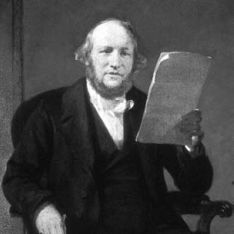
Biography
Alexander Wood was born on 10 December 1817 in Fife, the son of a physician. His family moved to Edinburgh’s New Town in 1821 where Wood received his early education at private schools before matriculating at Edinburgh University in 1832 where he studied arts and medicine. He graduated MD in 1839 and established his private practice in New Town. He was appointed physician to the Stockbridge and Royal Public dispensaries. On 15 June 1842 he married Rebecca Massey. Wood began lecturing at the extramural medical school in 1841, although he failed later attempts at appointments at the universities of Edinburgh and Glasgow.
Wood’s main contribution to medicine was discovering the technique of administering drugs using hypodermic syringe. Wood was inspired by James Young Simpson’s experiments on anaesthesia and became concerned with relieved localized pain. In 1853, Wood used a syringe and treated a case of neuralgia by injecting morphia in the area of discomfort.
By a remarkable coincidence, Charles Gabriel Pravaz (1791–1853), a French surgeon who had neither met nor been in contact with Wood, reported his invention in the same year, 1853, and then died soon afterwards. Prior to both men’s invention of the fine bore needle, others had used larger, cruder needles attached to tubing. The importance of Wood’s and Pravaz’s work was that needles could now be fixed onto syringes and smaller, measured doses injected, but years were to pass before the increased danger of infection was understood and sterilisation developed.
Wood fully embraced mid-nineteenth century developments in medical ideals surrounding a unified, well-educated and duly licensed body of practitioners. He promoted the scientific nature of contemporary medicine and attacked unorthodox forms of treatment, most notably homeopathy. He also played a prominent role in Scottish medical politics through his active participation with the Royal College of Physicians of Edinburgh. Wood led the negotiations for a new College Charter. The college at this time was extremely active in all areas of medical politics and reforming medical legislation. Wood played an important role in persuading the college to admit non-graduates into its licensing examinations. Wood campaigned for legislation on lunacy, pharmacy, the registration of births and marriages, and sanitary reform. He also argued strongly for the rights of the Edinburgh Extramural School of Medicine.
From 1846 to 1852 Wood was elected to the Edinburgh police commissioners as well as serving on other various committees. He chaired the acting committee of the Association for the Improvement of the Condition of the Poor, a charity that provided food and work for the unemployed. Wood was also involved in debates over the poor law in Scotland. His public work was fuelled by a strong personal faith. In 1843 he joined the Free Church of Scotland. Illness forced him to retire in 1873. Wood died in his home on 26 February 1884 after a short illness.
Notable Achievements
Wood was President of the Royal College of Physicians of Edinburgh from 1858 to 1861, after serving as secretary for six years.
Key Publications
• Homeopathy Unmasked (1844)
• A Sequel to Homeopathy Unmasked (1845)
• Rational Medicine (1849)
• What is Mesmerism (1851)
• ‘A new method of treating neuralgia by subcutaneous injection’, published in the Edinburgh Medical and Surgical Journal (1855)
• Vaccination as it is, was, and Ought to be (1860)



